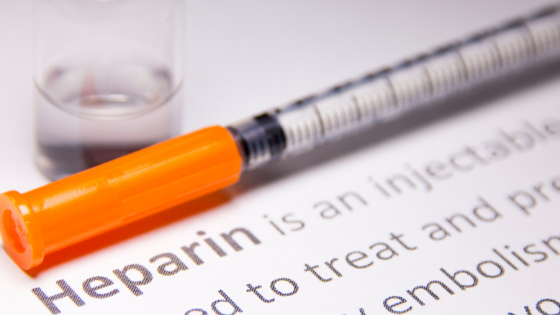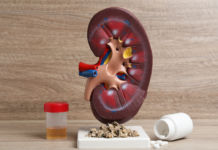*These statements have not been evaluated by the US Food and Drug Administration. This information is not intended to diagnose, treat, cure, or prevent any disease. Always consult with a qualified healthcare professional prior to beginning any diet or exercise program or taking any dietary supplement. The content on our website is for informational and educational purposes only.
Written By: Steve L. Belcher, RN, MSN, MS, DN-CM
Many patients that undergo outpatient hemodialysis use a medication that helps keep their blood from clotting inside the dialysis lines and artificial kidneys during treatment. This medication unbeknownst to many patients is called Heparin.
What is heparin?
Heparin is an anticoagulant, a blood thinner. It prevents blood from clotting.
Why do dialysis patients need heparin?
When blood is outside of the body, it clots. Whether due to an injury, such as a scraped knee, or due to it traveling through an artificial kidney, blood will coagulate when it is no longer safe outside one’s body. Typically, each ounce of blood pulled from the body during a dialysis treatment only remains outside its blood vessel home for around 45 seconds. But this is enough time for the clotting process to occur. Whether this clotting occurs in the artificial kidney or in the bloodlines, this clotted blood can no longer return to the patient. To prevent this loss of blood, heparin is typically given during dialysis treatment. Some are given through the needles immediately prior to the start of the treatment and more is given via a pump during treatment. Both of these amounts are ordered by your physician.
The term “tight heparinization” is used when, because of a medical reason, the amount of heparin given is lowered. For example, if a patient just had surgery or is to have surgery soon after a dialysis treatment, the dose will be reduced to minimize bleeding.

The key point to remember! Let your dialysis team know before the beginning of the treatment if you have had recent bleeding (for example, a nose bleed) or have a surgical procedure scheduled for later in the day. Your team will then decide if your heparin dosage should be adjusted downward for that particular treatment. If you have any questions concerning the amount of heparin you receive during hemodialysis treatment reach out to your kidney doctor he or she will be able to answer your questions.
About the author
Steven Belcher, RN, MSN, MS, is a dedicated kidney advocate who began his journey 20 years ago as a dialysis nurse. This job inspired him to help as many people with kidney disease as he could. Not only did he spend two decades caring for a patient’s physical and emotional needs in a clinical setting, but he also educated the public on the risk factors of kidney disease. Some of his many philanthropic successes include being a keynote speaker at the National Association of Nephrology Technicians/ Technologists (NANT), presenting at community spaces, and launching radio shows.
He now focuses his time entirely on his organization Urban Kidney Alliance, which educates the public about kidney disease. His goal? To lower rates of Chronic Kidney Disease in urban communities in Baltimore, Maryland, across the country, and globally through education and collaboration.
Steve has also written the book “HOW TO SURVIVE OUTPATIENT HEMODIALYSIS: A GUIDE FOR PATIENTS WITH KIDNEY FAILURE.” You can read the book review here.





